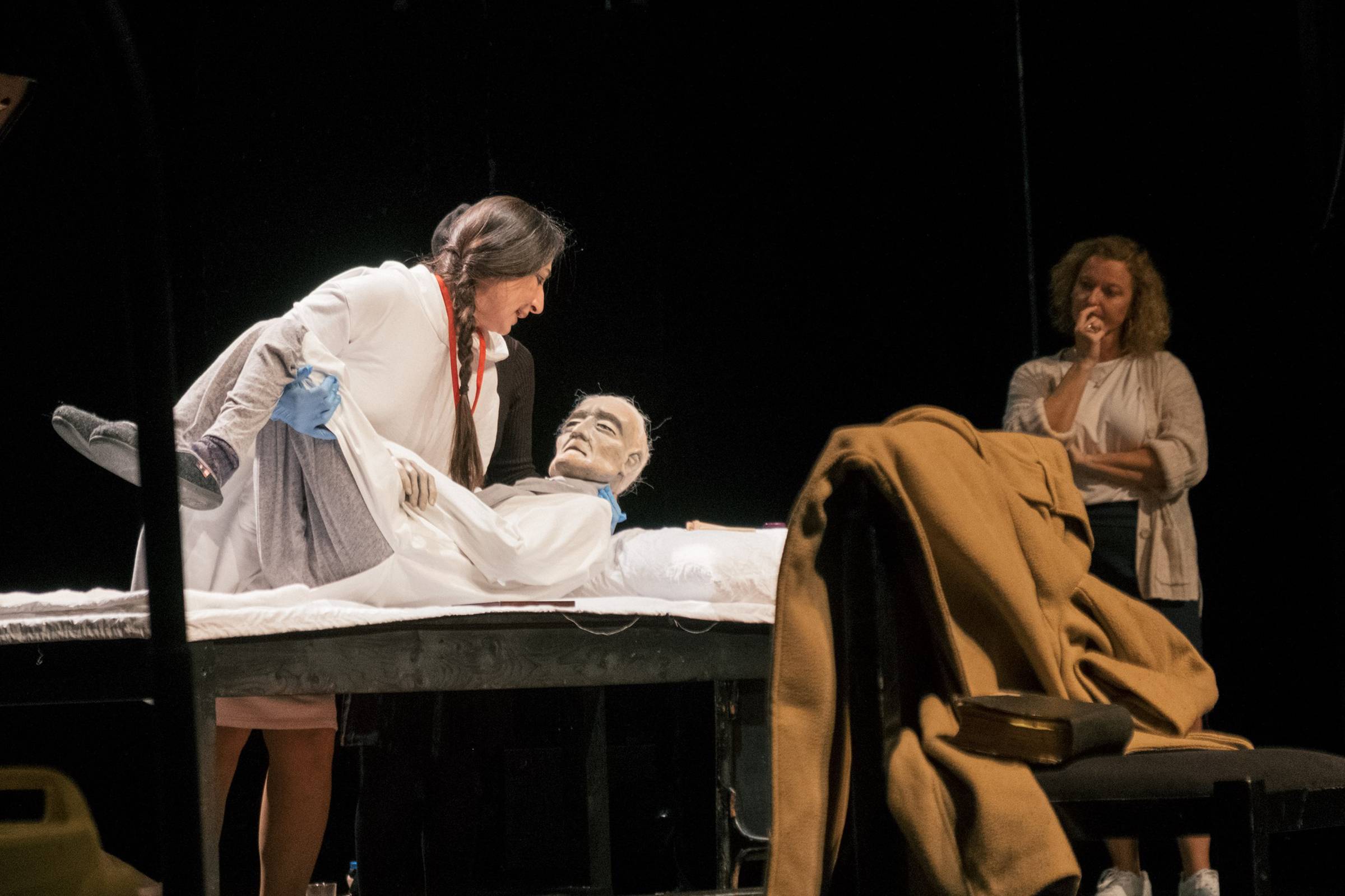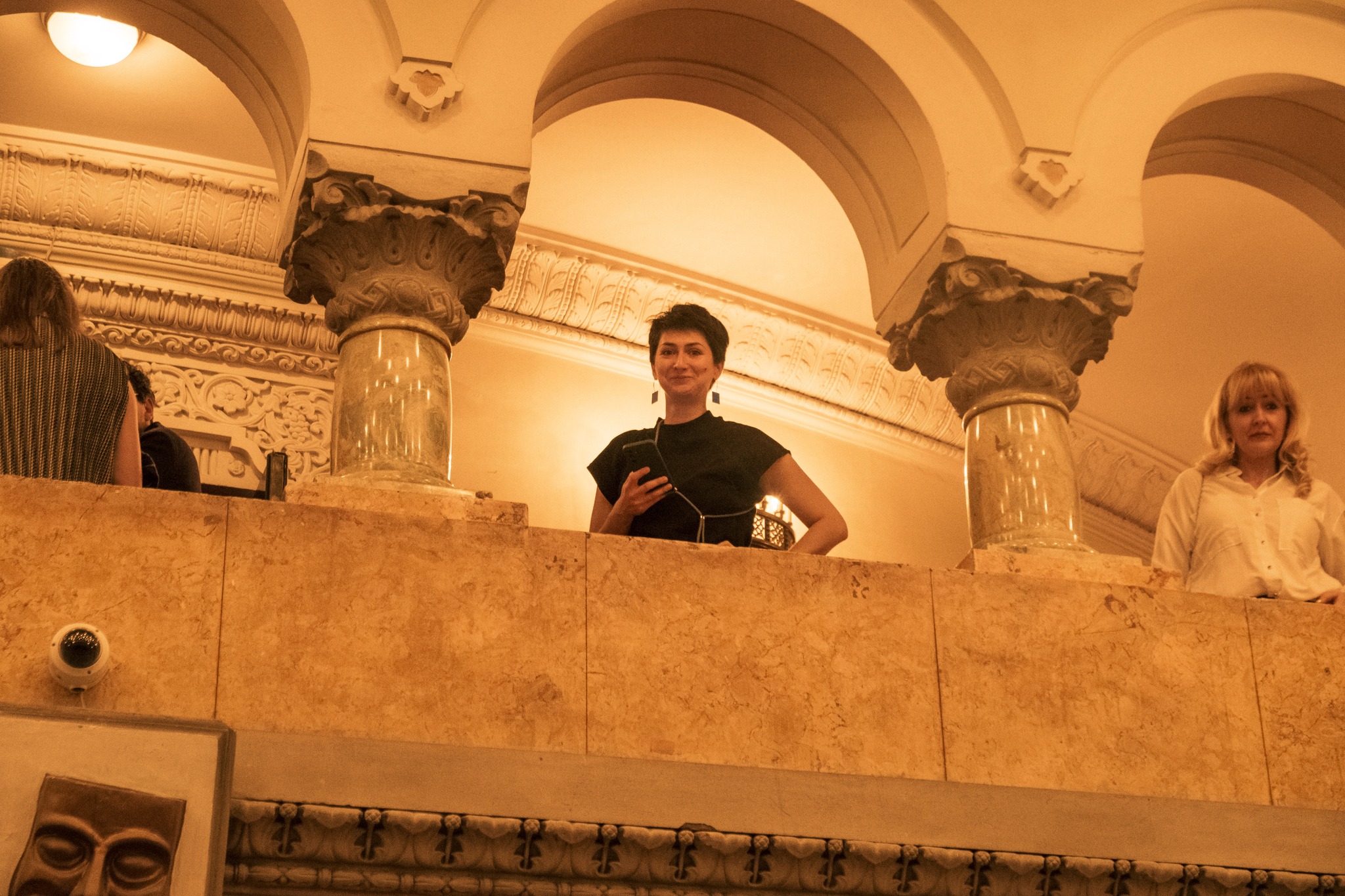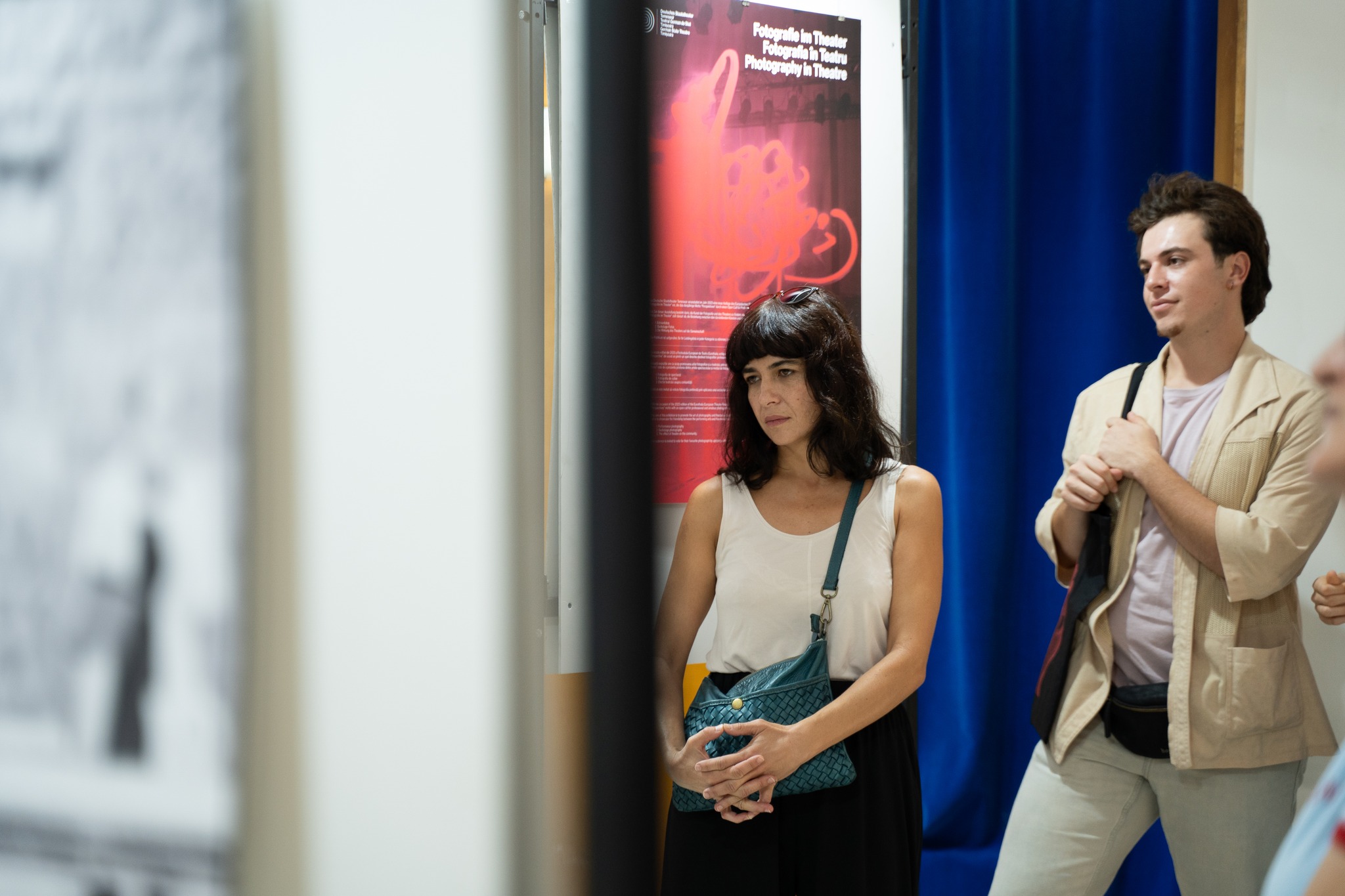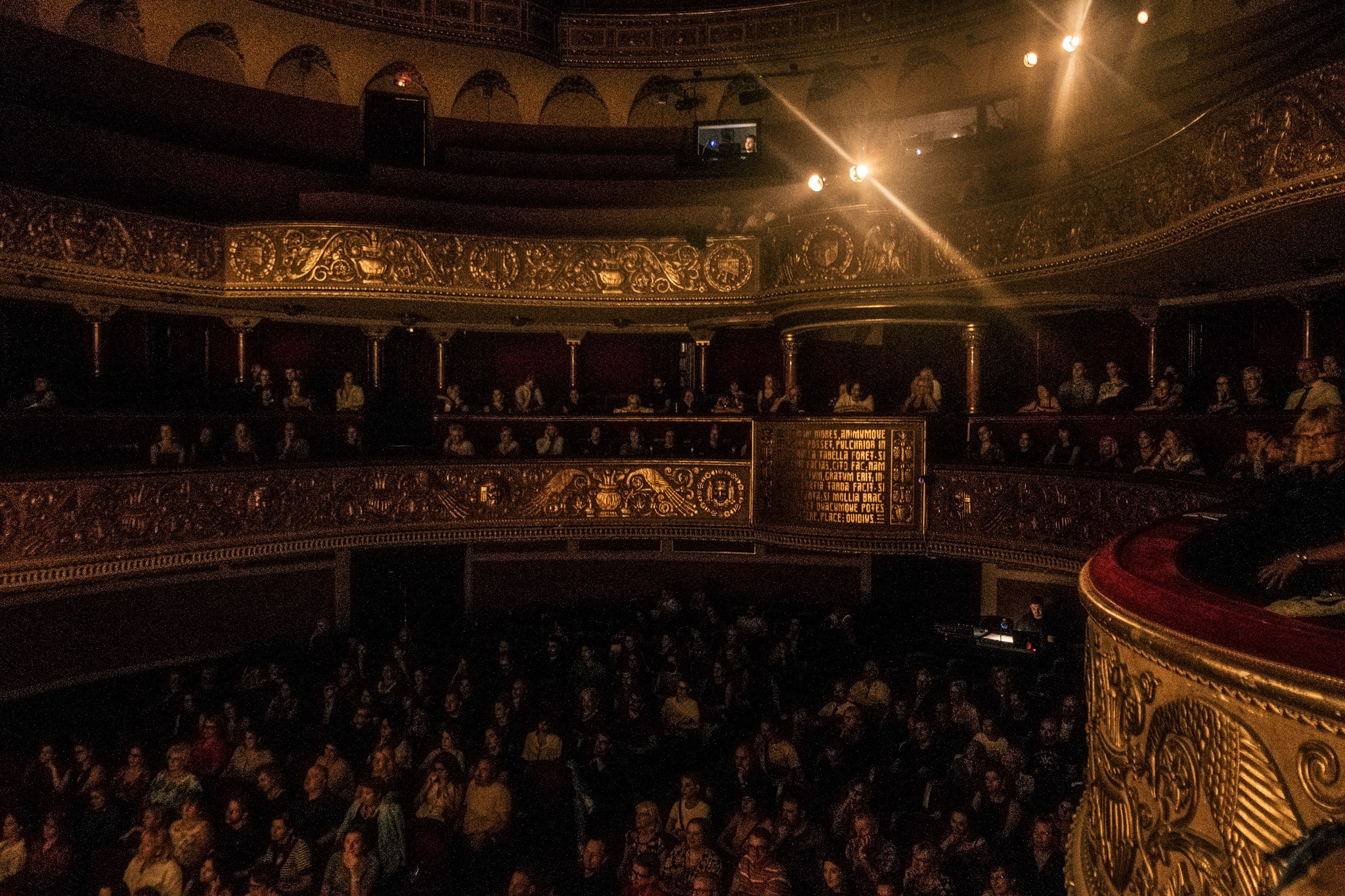
Who Are We?
2 October 2023Chronicle
by Elena Jebelean
We're
wondering. Are we the ones dancing with the four actors from 37 Matches or the Stolen Life – written
by Zdrava Kamenova and Gergana Dimitrova, directed by Bernhard M.
Eusterschulte, produced by TARTproduktion (DE), 36 Monkeys (BG) & FITZ
Stuttgart, TNL Luxembourg? At the end of
the show, are we also dancing the Greek dance that is
difficult to frame – an ancient, liberating folk dance from the Balkan (which
is an area of eternal conflict), like the one in Zorba the Greek by Nikos Kazantsakis? A dance of life and death, a
cathartic, purifying dance that releases one of frustrations and gives the
strength to overcome the disasters of their own destiny? Or an ecstatic,
ritualistic, Bacchic dance that heals through oblivion and changes one's
perspective on his own significance? Are we also dancing? Or are we just
watching, like at the theatre? At the beginning, we pass into the dance, while
at the end the music sounds like futility. For living near death sounds
ecclesiastical – vanitas vanitatum.
The suffering is terrible, of course, but we perceive it as even more terrible
when it is meaningless. Elena's life (the
sunshine) is a series of sufferings. Only mythology can save her. Somebody
asks her if she's faithful. She is. But she has no faith in a God who forgives
sinners, no matter how terrible their deeds may be, provided they repent. The
ancient gods, those whom we serve without even knowing it, are close to her,
they support her in her life which becomes an Orphic initiation route. She
initiates herself in death, caring for the dying, and the daily contemplation
of a certain river, represented in a certain painting, leads her to
revelations, superimposed on the still deeper deceptions.
“Who
are you?” is the question opening the show, the
question asked by the puppet character who suggests so well the lack of
independence of a man who can no longer take care of himself, who is forced to
bear the fact that he is handled (not manipulated, as his daughter fears) by a
stranger, by a caretaker who came all the way from Bulgaria, after he had
already managed to put all the previous ones on the run through his whims. But
his daughter, although she remains circumspect, is satisfied with the new
variant, because the Bulgarian women who do this job have three great
convenient characteristics, at least from the perspective of the agency Alive and Unharmed that provides such
services. They cook all sorts of traditional dishes, quite tasty; they always
sing while they work; they are cheap, they work five months in a row, not just
two, like the others, and they also never ask for a day off. This is Elena from
the perspective of the agency, from the
perspective of the old Mr. Zünder and his daughter, and even from the
perspective of the parrot in the old man's house. An Eastern European sow. How
many times must the parrot have heard this epithet that he can reproduce it
perfectly? For them, she is just that.
But
what does this woman who works abroad caring for the seventeenth sick old man mean
for her family back home in Bulgaria? She is their source of income, someone
who sends them the necessary money – her daughter, Kalina (the beautiful and good one), is raised by her grandparents. Elena's
mother, without wondering what money she would have lived on if Elena had
stayed home, reproaches her for not staying to take care of her own sick
father. She points out that her daughter is raised even better by her
grandparents than she as her mother would have been able to raise her. The girl
dreams of her (or just wants to hurt her, with the cynicism that sometimes is
specific to adolescence, amid the feeling of abandonment endured for so long),
parodying Little Red Riding Hood: "Mom, why do you have such a big nose?/
So I can better vacuum the dirt in the house without turning on the vacuum
cleaner./ Mom, why do you have such long hands?/ So I can better dust off the
top of the shelves./ Mom, why do you have such long ears?/ So I can hear when I
am called because I have to be available 24 hours a day./ You see, you don't
even look like a human being any more..." The
daughter declares her dead at school, she prefers this to explaining where and what she works. She even tells her, also in the name of her grandmother, not to come home
for Christmas, there is not much room for her there, and only the money she
sends is needed. Then she hangs up on her. And the main character feels that she is farther and farther away, not a soul in
search of the way to the other side, but a corpse that can no longer find rest.
She is accused of stealing 5
euros of the old man's money for euthanasia in Switzerland, which she had found
dusting the library, the others always
offend her and suspect that she would not work
enough, they say she would not fulfil her
duties well and timely, while the woman barely
has time to catch her breath or even to smoke a
cigarette. The terrible incident she causes, and which also leads to her
dismissal the morning after the last phone conversation with the daughter is throwing
of a third of the breakfast porridge for the old man on the 350000 euro worth painting in the living
room, called the River of Hades. But
which river might this be, she always had wondered, as a counterpoint, throughout the show, as a good connoisseur of Greek
mythology. Maybe Acheron, the river of pain and suffering? Perhaps Lethe, the river of oblivion? Or Kokytos, the mournful one,
to whom Charon approaches with his boat? Or Styx, the one of hate, the river
that nine times encircles the kingdom over which the merciless Hades reigns?
Doesn't myth teach us how to live?
The
matches are like Chekhov's revolver. Dropped on the floor and not recovered by
the old man at the beginning of the show, Elena will pick them up. The match number 37 will be used for purification in the
end. Still wondering which river was
represented in the painting in the living room, looking quite like the black Styx in which Thetis had immersed
Achilles in order to be invulnerable, now,
after so much suffering, being herself invulnerable to humanity, she decides
that it was time for the river of fire and boiling blood, Pyriflegeton, to mark
the inferno of her own experience. As in a ritual, she stirs this river and
perishes in the nothingness, towards the Asphodel Plains, not only described by
her but also represented on stage by the bowl with white tulips suspended above
the first rows of spectators. Following her, calcined, the bodies of the three
– the old man, his daughter, and the agency mediator.
The
moments of play and tenderness are unique. Like a baby who throws all the
objects around to be returned to him only that he can throw them once again,
checking the gravity, the old man throws a paper roll, and Elena always returns
it to him, they both seem to enjoy this game. She caresses him gently on the back, thus reminding him of the soul by
which he had felt loved, a dog that he, too, caressed on the back. He would
love to stroke a dog on the back now... The vicious circle of lack of affection
breeds monsters.
Who
are we? We are worthy people who respect ourselves by respecting others. We are
people capable of admiration, capable of recognizing the merits of others. We
do not exploit, we do not take advantage. We do not use others, we do not
despise them by using them. We do not divide the world into rich and poor, we
do not mock those who help us, we do not lower hell on earth. That's for at
least 37 minutes, at the exit from the show. And not for the sake of the
Asphodel Plains, nor in the hope of enjoying the Elysium, not for the fear of
being tormented in Tartarus. But because, seeing the show, I drank from the
water of Mnemosyna, the one not mentioned here, Lethe's counterpart. We live
and die by remembering, not by forgetting.
---
“Theatre
Chronicle @ Eurothalia” is a programme conceived by Daniela Șilindean together
with the team of the German State Theatre Timișoara, within the Eurothalia 2023
European Theatre Festival, held between 20-30 September 2023, financed by the
National Cultural Program Timișoara - European Capital of Culture in 2023.


